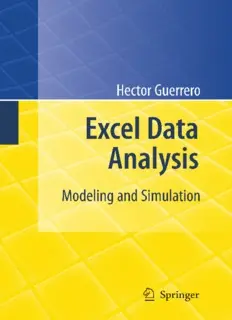Table Of Content
Excel Data Analysis
Hector Guerrero
Excel Data Analysis
Modeling and Simulation
123
Dr.HectorGuerrero
MasonSchoolofBusiness
CollegeofWilliam&Mary
Williamsburg,VA23189
USA
[email protected]
ISBN978-3-642-10834-1 e-ISBN978-3-642-10835-8
DOI10.1007/978-3-642-10835-8
SpringerHeidelbergDordrechtLondonNewYork
LibraryofCongressControlNumber:2010920153
©Springer-VerlagBerlinHeidelberg2010
Thisworkissubjecttocopyright.Allrightsarereserved,whetherthewholeorpartofthematerialis
concerned,specificallytherightsoftranslation,reprinting,reuseofillustrations,recitation,broadcasting,
reproductiononmicrofilmorinanyotherway,andstorageindatabanks.Duplicationofthispublication
orpartsthereofispermittedonlyundertheprovisionsoftheGermanCopyrightLawofSeptember9,
1965,initscurrentversion,andpermissionforusemustalwaysbeobtainedfromSpringer.Violations
areliabletoprosecutionundertheGermanCopyrightLaw.
Theuseofgeneraldescriptivenames,registerednames,trademarks,etc.inthispublicationdoesnot
imply,evenintheabsenceofaspecificstatement,thatsuchnamesareexemptfromtherelevantprotective
lawsandregulationsandthereforefreeforgeneraluse.
Coverdesign:WMXDesignGmbH,Heidelberg
Printedonacid-freepaper
SpringerispartofSpringerScience+BusinessMedia(www.springer.com)
Tomywonderfulparents...PacoandNena
Preface
WhydoestheWorld Need—ExcelDataAnalysis,Modeling,and
Simulation?
When spreadsheets first became widely available in the early 1980s, it spawned a
revolution in teaching. What previously could only be done with arcane software
and large scale computing was now available to the common-man, on a desktop.
Also, before spreadsheets, most substantial analytical work was done outside the
classroom where the tools were; spreadsheets and personal computers moved the
work into the classroom. Not only did it change how the analysis curriculum was
taught, but italso empowered students to venture out on their own to explore new
ways to use the tools. I can’t tell you how many phone calls, office visits, and/or
emailsIhavereceivedinmyteachingcareerfromecstaticstudentscrowingabout
whattheyhavejustdonewithaspreadsheetmodel.
Ihavebeenteachingcoursesrelatedtospreadsheetbasedanalysisandmodeling
forabout25yearsandIhavewatchedandparticipatedinthespreadsheetrevolution.
Duringthattime,Ihavebeenawitnesstothefollowingobservations:
• Each year has led to more and more demand for Excel based analysis and
modelingskills,bothfromstudents,practitioners,andrecruiters
• Excel has evolved as an ever more powerful suite of tools, functions, and
capabilities,includingtherecentiterationandbasisforthisbook—Excel2007
• TheingenuityofExceluserstocreateapplicationsandtoolstodealwithcomplex
problemscontinuestoamazeme
• Thosestudentsthatprecededthespreadsheetrevolutionoftenfindthemselvesat
alossastowheretogoforanintroductiontowhatiscommonlytaughttomost
manyundergraduatesinbusinessandsciences.
Eachofonetheseobservationshavemotivatedmetowritethisbook.Thefirstsug-
geststhatthereisnoforeseeableendtothedemandfortheskillsthatExcelenables;
in fact, the need for continuing productivity in all economies guarantees that an
individual with proficiency in spreadsheet analysis will be highly prized by an
vii
viii Preface
organization.Ataminimum,theseskillspermityoufreedomfromspecialiststhat
candelayorholdyoucaptivewhilewaitingforasolution.Thiswascommoninthe
earlydaysofinformationtechnology(IT);yourequestedthattheITgroupprovide
you with a solution or tool and you waited, and waited, and waited. Today if you
needasolutionyoucandoityourself.
Thecombinationofthe2ndand3rdobservationssuggeststhatwhenyoucouple
bright and energetic people with powerful tools and a good learning environment,
wonderful things can happen. I have seen this throughout my teaching career, as
well as in my consulting practice. The trick is to provide a teaching vehicle that
makestheanalysisaccessible.Myhopeisthatthisbookissuchateachingvehicle.
Ibelievethattherearethreesimplefactorsthatfacilitatelearning—selectexamples
thatcontaininterestingquestions,methodicallyleadstudentsthroughtherationale
oftheanalysis,andthoroughlyexplaintheExceltoolstoachievetheanalysis.
The last observation has fueled my desire to lend a hand to the many students
thatpassedthroughtheeducationalsystembeforethespreadsheetanalysisrevolu-
tion; to provide them with a book that points them in the right direction. Several
yearsago,IencounteredaformerMBAstudentinaCincinnatiAirportbookstore.
HeexplainedtomethathewaslookingforagoodExcel-basedbookonDataanal-
ysisandmodeling—“Youknowit’sbeenmorethan20yearssinceIwasinaTuck
School classroom, and I desperately need to understand what my interns seem to
beabletodosoeasily.”Byprovidingabroadvarietyofexemplaryproblems,from
graphical/statisticalanalysistomodeling/simulationtooptimization,andtheExcel
toolstoaccomplishtheseanalyses,mostreadersshouldbeabletoachievesuccess
intheirself-studyattemptstomasterspreadsheetanalysis.Besidesagoodcompass,
students also need to be made aware of the possible. It is not usual to hear from
students“CanyouuseExceltodothis?”or“Ididn’tknowyoucoulddothatwith
Excel!”
WhoBenefitsfromthisBook?
This book is targeted at the student or practitioner that is looking for a single
introductoryExcel-basedresourcethatcoversthreeessentialbusinessskills—Data
Analysis,BusinessModeling,andSimulation.Ihavesuccessfullyusedthismaterial
with undergraduates, MBAs, Executive MBAs and in Executive Education pro-
grams. For my students, the book has been the main teaching resource for both
semester and half-semester long courses. The examples used in the books are suf-
ficiently flexible to guide teaching goals in many directions. For executives, the
book has served as a compliment to classroom lectures, as well as an excellent
post-program,self-studyresource.Finally,Ibelievethatitwillservepractitioners,
likethatformerstudentImetinCincinnati,thathavethedesireandmotivationto
refurbish their understanding of data analysis, modeling, and simulation concepts
throughself-study.
Preface ix
KeyFeaturesofthisBook
IhaveusedanumberofexamplesinthisbookthatIhavedevelopedovermanyyears
ofteachingandconsulting.Somearebriefandtothepoint;othersaremorecomplex
and require considerable effort to digest. I urge you to not become frustrated with
themorecomplexexamples.Thereismuchtobelearnedfromtheseexamples,not
only the analytical techniques, but also approaches to solving complex problems.
Theseexamples,asisalwaysthecaseinreal-world,messyproblems,requiremak-
ing reasonable assumptions and some concession to simplification if a solution is
to be obtained. My hope is that the approach will be as valuable to the reader as
theanalyticaltechniques.Ihavealsotakengreatpainstoprovideanabundanceof
Excelscreenshotsthatshouldgivethereaderasolidunderstandingofthechapter
examples.
But, let me vigorously warn you of one thing—this is not an Excel how-to
book. Excel how-to books concentrate on the Excel tools and not on analysis—it
isassumedthatyouwillfillintheanalysisblanks.TherearemanyexcellentExcel
how-tobooksonthemarketandanumberofexcellentwebsites(e.g.MrExcel.com)
whereyoucanfindhelpwiththedetailsofspecificExcelissues.Ihaveattempted
to write a book that is about analysis, analysis that can be easily and thoroughly
handled withExcel. Keep thisin mind as you proceed. So insummary, remember
that the analysis is the primary focus and that Excel simply serves as an excellent
vehiclebywhichtoachievetheanalysis.
Acknowledgements
I would like to thank the editorial staff of Springer for their invaluable support—
Dr. Niels Peter Thomas, Ms. Alice Blanck, and Ms. Ulrike Stricker. Thanks to
Ms. Elizabeth Bowman for her excellent editing effort over many years. Special
thanks to the countless students I have taught over the years, in particular Bill
Jelen, the world-wide-web’s Mr. Excel that made a believer out of me. Finally,
thanks to my family and friends that took a back seat to the book over the years
ofdevelopment—Tere,Rob,Brandy,Mac,Lili,PT,andScout.

